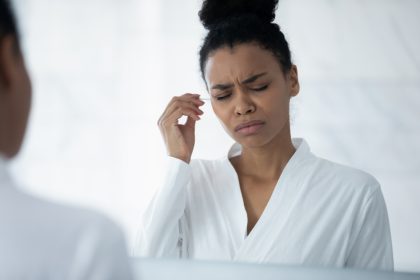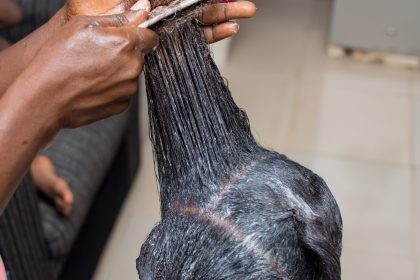In a compelling dialogue about HIV awareness, public health, and community healing, Marvell Terry II, a distinguished public health practitioner and human rights activist from Memphis, Tennessee, shares profound insights on addressing HIV stigma in the Black community.
As a Senior Program Manager at Funders Concerned about AIDS and member of the Presidential Advisory Council on HIV/AIDS, Terry brings both personal experience and professional expertise to this crucial conversation. His work organizing the Saving Ourselves Symposium and the BLK in the South Summit has established him as a leading voice in HIV advocacy and community mobilization.
This piece is part of a series in collaboration with Southern AIDS Coalition to tell the powerful stories of the Black community and HIV in the South.
Why should we celebrate Black HIV day?
It falls historically February 7th, and it falls within Black History Month. We observed the day because we want to bring this attention to HIV in the black community. The organizers thought that putting something within Black History Month allows some synergy to take place for black folks to have some conversations around HIV.
How should we address stigma in our community?
How do we continue to have these conversations as a black community? When we use the word celebration, it is a moment to celebrate our resilience as black folks. It’s a moment to celebrate that, although racism and white supremacy make us vulnerable to so many illnesses in this country, that we have a moment to celebrate our existence and our resilience. But in that celebration, also we have to recognize that our community is still suffering, that we lead in every category. We are the highest amongst black amongst men.
Black men are the highest amongst men. You have women. Black women are the highest among women. You got young black young folks. You got black trans folks who are leading. And when you look at the overall epidemic HIV epidemic, black folks are leading in every category, I would suggest that we have to interrogate why we are in this position, and to continue to have those conversations.
If you were giving a speech at a black church about erasing stigma, what would be your title?
Cut to the chase. think the title of my speech, my sermon, my message, would be “Cut to the Chase,” because I don’t believe that black folks like to have authentic conversations, and I would challenge the parishioners to actually talk about sexuality, to actually talk about pleasure and intimacy as black folks. We don’t like to talk about that. We all enjoy pleasure. We all enjoy intimacy. How do we reclaim this which was taken from us, from our slave masters? We get to enjoy pleasure, too. But when we talk about sex and HIV, we have to actually acknowledge that we are a people that enjoy sex, so let’s cut to the chase. We all like to talk about sex.
How do people negotiate romance and HIV status?
As a person living with HIV myself, I was diagnosed many years ago in my hometown of Memphis, Tennessee, and I am often positioned to be very honest and open about my status with people, and when you talk about this negotiation that happens, you have to be open and honest and have empathy. Me having HIV does not make me less than, it does not make me insufficient, it does not make me not enough.
Matter of fact, I am enough. I just have HIV similar to people with diabetes or with cancer, or they go to dialysis. Many of us arrive at life at different stations in life, and it requires of us as black folks at the intersection, I believe that love Jesus requires us to have compassion for those that might be different than us, or those that we might not understand. We still approach those conversations with compassion, with grace, with understanding. One of my challenges often to black folks is, we often do not approach conversations to understand and to listen. We approach conversations getting ready to respond, and I think a conversation like HIV is a conversation that we often should listen to and not be ready to respond.
What should be the response when someone shares their HIV status?
We have to acknowledge the criminalization of HIV. In Southern States people are criminalized just for the ideal of having HIV. I think also we should insert into this conversation that often there’s a criminalization of black bodies, black mothers, black children, black folks, and HIV is one of those things that we often get criminalized about. As a person living with HIV, if I’m sharing with you that I have HIV, I don’t want sympathy, I live a regular life. If this was me 10 years ago or 15 years ago, when I was first diagnosed, and I’m telling you about my status, I think a question or response for me is, how do I show up for you? How do I support you? What support do you need going to the doctor? Are you taking your medication? Each situation is different.
But I think one of those initial questions is, how do I support you? What support do you need going to the doctor? Are you taking your medication? Each situation is different. But I think one of those initial questions is, how do I support you? It’s no different than someone saying, “Hey, I’m going through a divorce right now.” “Why are you telling me this? Do I need to know this information?” Apparently you want me to know this, and so I think my response would be, how do I show up for you? How can I be intentionally present for you? Presence is a gift, and I think we don’t often recognize that our presence in someone’s life can actually mean something, particularly people living with HIV.
How can parents support their children who test positive?
Children depending on the age of the child, the parents don’t have to be involved in the conversation. The person gets to choose who they tell. When I told my family I had an auntie to scream in the room. I had a family meeting. My father walked out of the room. In that moment I felt offended. In that moment I was hurt. In that moment I was afraid about what was next. But after I’ve lived a long time a little longer, I recognize that my parents and my aunts, who are in their sixties, were responding to the information that they had, and as people who grew up in the eighties and nineties when they heard HIV they heard death, and for me, it was a moment to educate and to live my life out loud. For that child or for that young person, I think the parent has to be patient.
I know HIV can be considered a life or death situation, but I imagine coming home to my mother and say, “Hey, I failed this class.” What would the response be? And I know that one is about education, and one is about life and your health. But I would imagine that the response is the same. What more support do you need? How can I show up with you? How can I give you a hug in this moment? And how do we walk this journey together? If I came home and said I had a bad grade, the response is tutoring. What support do you need? I would imagine that if I came home and said, “Hey, mom, hey, dad, I have HIV.” What medicine do you need? Can I go to your doctor’s appointment with you? How can I educate myself about HIV, so that I can be a better parent to you? I think those are the responses.
What words of comfort would you share with someone newly diagnosed with HIV?
I think I will whisper to the person that it’s gonna be all right, that I think in those moments it might look dark. It might look like you will not defeat it, but, as the poster behind me says, keep fighting, and I think we all have to figure out ways in our life to keep fighting. Whether this is HIV, whether it is policies coming out of the White House, whether it is white supremacy. I think black folks have always found ourselves in position to fight, and oftentimes such as HIV, we segment our community and we separate ourselves. But this is all of all of our fight.
How would you describe your artistic voice?
I’m a son of the South, and I’m a son of Memphis, Tennessee, and I often think my voice is a very poetic voice. My voice, I think, is a voice crying out in the wilderness, like Jeremiah in the sacred text. I think my voice is one, I think of my grandmother, who was a cafeteria manager and her ministry, and her voice was bringing people together by food. I, too, think of that voice as a mobilizer, but also as a person that agitates and interrogates, and as a son of the South, I think of John Lewis when he said, get into some good trouble, and I often find myself in good trouble.
How important is it to understand and embrace healthy habits and innovations like PrEP?
I wanna love better. I want to live long, and I want to fully enjoy the experience of love. Whether I’m taking my HIV medicine to stay in care, you know, U equals U undetectable equals being untransmittable if I’m taking my medication every single day. But I also think about prep pre-exposure prophylaxis that if I’m HIV negative, I can take that. All those new modalities and innovative ways of health care is helping us to survive. But you still find black folks still at the bottom of those lists we do not access prep. At the same pace as our racial counterparts. We didn’t even know about Prep at the pace of our racial counterparts. Then you have to interject religious dogma that is, in the South, that some doctors in the South would not prescribe prep to often black folks in our communities, particularly rural areas.
While all of these modalities are accessible and they are available, what our healthcare system has created is a system of the have and the have nots. If I have private healthcare insurance, I get access to the Cadillac service. But if I don’t have insurance, I often do not get access to these tools. We have to educate ourselves about these tools. I would challenge us even more that we can talk about this in church. We can talk about pre-exposure prophylaxis for black women or for black men. But we first have to have that conversation that we are actually engaging in sex, and we don’t want to have that conversation.
What Southern traditions about love and self-worth need to change in our community?
I think there’s a lot. I’ve also lived in Chicago. I’ve lived in New York. I lived in DC. And as I’ve lived in these places, there’s a lot that the South told me that I had to unlearn about loving myself about being a black man, about being a darker skin, black man from the South being from Memphis this religious town, and I think one of the things that we have to unlearn about love or about ourselves is that we are enough, and I think so often we have told ourselves, or have been told, that we are enough, and when I believe that I am enough, I can negotiate condom usage. I can negotiate, negotiate, what type of sex that I want to have because I value myself. I value my health. I value my body.
Those are the things that I had to integrate into my life, and that also included therapy. So one, my own value is something I had to unlearn. The way that I view sex and sexuality is something that I had to unlearn. It is okay to have sex. It is okay to explore life, like many of us do. And it is okay to make mistakes. And those are the things that, coming from the South that I really had to unlearn when it came to loving myself.
What does “Stand with Black Women” mean in this moment?
92% of black women showed up at the polls. And you know this last presidential election. And we have the result that we have, and I think black women often feel that they are neglected, but they are usually carrying us on their back. I come from a black mother raised by a black grandmother, and receive sermons every Sunday from a black woman. A black woman was my pastor in Memphis.
I think it’s important to stand alongside black women and to actually show up and to infuse those conversations. How do we talk about reproductive justice? How do as men on this call? How do we talk about standing in proxy for black women to ensure that they have the right to do with their bodies, just as I get to as a man that black women also get to do with what they need to do with their bodies.














